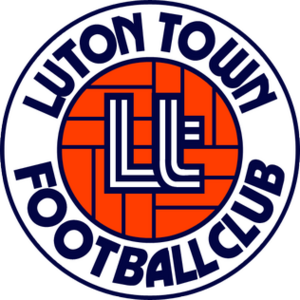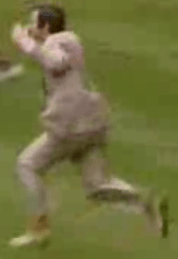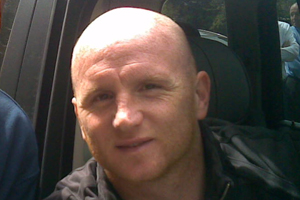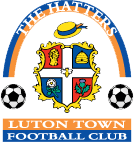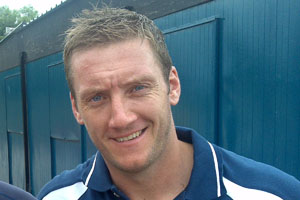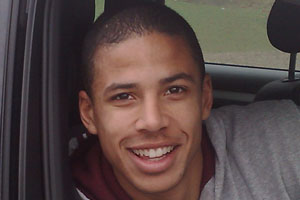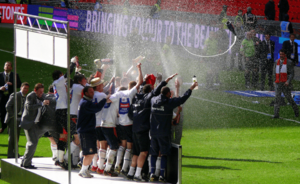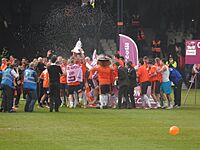History of Luton Town F.C. (1970–present) facts for kids
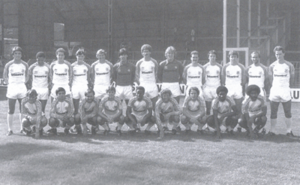
Luton Town Football Club is a professional football team. It is based in Luton, Bedfordshire, England. After a short time in the top league in 1974–1975, the team spent the rest of the 1970s in the second division.
David Pleat became manager in 1978. He built a strong team that won promotion in 1981–1982. Pleat helped Luton stay in the top league before he left in 1986. Later, Ray Harford's Luton team famously beat Arsenal 3–2 in the 1988 League Cup Final. They were runners-up the next year, losing to Nottingham Forest. Luton Town was relegated from the top league after the 1991–1992 season. They had been a top team for ten years.
The team reached the FA Cup semi-final in 1993–1994, again with Pleat as manager. But they were relegated again in 1995. Luton dropped to the fourth league in 2001. However, under Joe Kinnear, they quickly moved back up. Mike Newell became manager in 2003. He led Luton to the Championship before being fired in 2007.
Luton then faced three relegations in a row. They also had 40 points taken away due to money problems. This meant Luton Town left The Football League at the end of the 2008–2009 season. They stayed in the fifth league for five years. Then, they won promotion in 2013–2014 with a club record 101 points.
Luton earned promotions from League Two and League One in back-to-back seasons in 2017–18 and 2018–19. They were then promoted to the Premier League after winning the 2022–23 EFL Championship play-off final.
Contents
Luton Town's Football Journey
Rising Through the Ranks (1970–1982)
Malcolm Macdonald was a great goalscorer in 1970–1971. Luton did very well in their first season back in the Second Division. They finished sixth, close to promotion to the top league. However, the club was losing a lot of money. Macdonald was sold to Newcastle United for £180,000. This helped solve the money problems.
For the next two years, Luton finished in the middle of the table. In 1972, manager Alec Stock left. Harry Haslam took over. Luton finished second in 1973–1974 and were promoted. But they only stayed in the top league for one year. They were relegated by just one point in 1974–1975.
In December 1975, the club faced serious money problems again. The club's directors used their own money to pay wages. This stopped the club from closing down. The sale of Peter Anderson for £80,000 helped ease the financial pressure. Despite these issues, Luton finished seventh in 1975–1976.
The next season, Luton finished sixth. Then, they dropped to 13th in 1977–1978. This led to Haslam leaving for Sheffield United. His assistant, David Pleat, became the new manager.
Building a Winning Team
Pleat's first full season was tough, but he made smart player signings. He brought in players like Mal Donaghy, David Moss, and captain Brian Horton. These players joined talented local players like midfielder Ricky Hill and top scorer Brian Stein. Pleat even signed Yugoslav defender Raddy Antić from Spanish club Real Zaragoza in 1980.
Luton finished sixth, then fifth. Then, they became champions in 1981–1982. They were at the top of the league for most of the season. They finished with 88 points, eight points ahead of their rivals Watford.
Life in the Top League (1982–1992)
Under Pleat, Luton played an exciting, attacking style of football. In 1982–1983, they scored the second-highest number of away goals. On the last day of the season, Luton needed to beat Manchester City to stay in the top league. City only needed a draw. With seven minutes left, substitute Raddy Antić scored the winning goal. This secured Luton's place in the top league. Pleat famously danced across the pitch in celebration.
The next two seasons, Luton finished 16th and then 13th. They also reached the FA Cup semi-finals. In 1984, talented forward Paul Walsh was sold to Liverpool.
A Strong Start and a Famous Riot
The 1983–1984 season started great for Luton. They were third in the league by Christmas. Hopes of winning the title grew. However, their form dropped in the second half of the season. They finished 16th, just above the relegation zone.
In December 1984, Mick Harford joined the team. On 13 March 1985, there was a serious riot by Millwall fans during an FA Cup match. This caused damage to the stadium and nearby areas. The club then banned all away supporters from their stadium, Kenilworth Road. Home fans also needed membership cards. Luton beat Millwall 1–0 and reached the semi-finals. They played Everton, who were winning the league. Luton held their own, but Everton won 2–1 after extra time. In the league, Luton finished 13th and were safe from relegation.
Before the 1985–1986 season, Luton replaced their grass pitch with an artificial one. This "plastic pitch" was not popular. That season, Luton stopped Manchester United's winning streak. They drew 1–1 at Kenilworth Road.
Manager Changes and a Major Trophy
At the end of 1985–1986, Pleat left for Tottenham Hotspur. His last season ended well, with a ninth-place finish. Coach John Moore took over. He led Luton to a seventh-place finish in 1986–1987. This is still the club's highest-ever league finish. Moore then resigned, and his assistant Ray Harford became manager.
The 1987–1988 season was very successful. Luton famously beat Arsenal 3–2 in the League Cup final at Wembley. Brian Stein scored early to give Luton a 1–0 lead. Arsenal came back to lead 2–1. But with ten minutes left, goalkeeper Andy Dibble saved a penalty. This gave Luton new energy. They scored two more goals in the last seven minutes, with Brian Stein scoring the winner. This was Luton's only major trophy. They also finished ninth in the league and reached the FA Cup semi-finals.
Decline and Relegation
The 1988–1989 season saw Luton finish 16th. They reached another League Cup final but lost to Nottingham Forest. Key players started to be sold. Danish international Lars Elstrup became Luton's record signing in 1989. But Mick Harford was sold in January. Ray Harford was fired in January 1990. Coach Jim Ryan took over. Ryan kept Luton in the top league for two seasons. Both times, they avoided relegation on the last day against Derby.
David Pleat returned as manager in 1991. More players were sold, including Kingsley Black for £1.5 million. Striker Iain Dowie and full back Tim Breacker were sold for £1.05 million.
Luton had a tough start to the 1991–1992 season. Pleat brought back Mick Harford and Brian Stein. Harford was the top scorer with 12 goals. Luton still had a chance to avoid relegation on the last day. They needed to win their first away match of the season against already-relegated Notts County. Luton took the lead, but Notts County scored two late goals. This meant Luton were relegated. They missed out on playing in the first Premier League season and the money that came with it.
Falling from the Top (1992–2001)
After leaving the top league, it was hard for Luton to keep their best players. Mick Harford signed for Chelsea. In their first season back in the Football League, Luton almost dropped to the third league. The team faced challenges, including a car accident involving two players. Luton were at the bottom of the table. David Pleat brought Luton-born England international Kerry Dixon on loan. Dixon helped Luton stay up.
In 1993–1994, Dixon joined permanently. Luton struggled in the league but did well in the FA Cup. They reached the FA Cup semi-final at Wembley. 27,500 Luton fans watched Chelsea win 2–0. After the cup defeat, Luton lost five league games. But a 3–2 win over West Bromwich Albion helped them stay in the second league.
Luton struggled again in 1994–1995. Young players like Scott Oakes, Paul Telfer, and John Hartson played well. When Pleat turned down an offer from Tottenham, the team improved. They moved up to fifth in the table. Promotion looked possible. But then, Hartson was bought by Arsenal for £2.5 million. This was a record fee for a teenager. After Hartson's sale, the season ended quietly, with Luton finishing 16th.
Pleat left for the second time in 1995. Terry Westley took over but was fired after six months. Lennie Lawrence replaced him. But he could not stop Luton from finishing last in the First Division.
The 1996–1997 season started badly. But young forward Andrew Fotiadis helped the team. They climbed the table with a great run of wins. Tony Thorpe scored 28 goals, becoming the league's top scorer. Luton almost got promoted. They finished third but lost in the play-offs.
In 1997, teenager Matthew Upson was sold to Arsenal for £2 million. Star forward Tony Thorpe was sold for £800,000. Luton looked like they would be relegated. But David Pleat, now at Tottenham, sent Rory Allen on loan. Allen scored six goals in eight matches, helping Luton stay up.
1998–1999 saw a 12th-place finish and a run to the League Cup quarter-finals. Before the 1999–2000 season, the club was sold to Cliff Bassett. Players continued to be sold to balance the books. Lawrence managed to keep the inexperienced team in the league.
Mike Watson-Challis bought the club in 2000. Lawrence was fired. Former Luton player Ricky Hill became manager but was dismissed after only two wins. Another former player, Lil Fuccillo, took over. Then, Joe Kinnear was brought in as Director of Football. He quickly made himself manager. Kinnear signed tall forward Steve Howard for only £50,000. Despite his efforts, the club was relegated to the lowest league in The Football League for the first time since 1968.
A New Beginning (2001–2006)
Joe Kinnear planned for Luton to get promoted right away. He changed almost the entire team. He built one of Luton's best teams in years. Midfielder Kevin Nicholls joined for £25,000 and became a key player and captain. Australian defender Chris Coyne signed for £50,000. Steve Howard won the Third Division top scorer award with 24 goals. Luton ended the season with a club record 12 wins in a row. They secured promotion back to the third league in March by winning 3–1 against Swansea City.
After the season, star players Jean-Louis Valois and Matthew Taylor left. Despite these losses, Luton finished ninth in the third league in 2002–2003.
The club was losing a lot of money. Chairman Mike Watson-Challis sold the club to a group led by John Gurney in May 2003. Kinnear and his assistant Mick Harford were fired. Gurney's time was strange. He tried to merge the club with another team and planned a huge stadium. Gurney was eventually removed by a supporters' group. He left the club in financial trouble. But he did appoint Mike Newell as manager.
Newell brought Mick Harford back as coach. Newell surprised everyone by leading the club to a tenth-place finish in 2003–2004. This was despite the club not being allowed to buy new players. In May 2004, a new group led by Bill Tomlins bought the club.
The 2004–2005 season started amazingly. Luton won nine and drew one of their first ten games. They were nine points clear at the top of the league. Experienced players like Chris Coyne, Kevin Nicholls, and Steve Howard played well with young talents. This team became champions. Promotion was secured on 12 April. The League One title was won two weeks later, on 23 April.
In 2005–2006, few new players were bought. David Bell was signed for £100,000. Finland international Markus Heikkinen and Trinidad and Tobago's Carlos Edwards also joined. However, star defender Curtis Davies was sold to Premier League team West Bromwich Albion for a club record £3 million. Newell's team started well, topping the table. They finished tenth, which was a great achievement. In the FA Cup, they had a memorable 5–3 loss to European Champions Liverpool at Kenilworth Road.
Tough Times (2006–2009)
After a good start to the 2006–2007 season, defender Sol Davis had a stroke on the team bus. This affected the players, and Luton lost 5–0. A long run of bad results followed. By February, Luton was close to the relegation zone.
Newell was fired on 15 March 2007. Two directors resigned in protest. Brian Stein was caretaker manager for one game. Then, Kevin Blackwell became the new manager. On 11 April, chairman Bill Tomlins resigned. An investigation by the Football Association found that illegal payments had been made to players' agents. David Pinkney became the new chairman. Luton's relegation was confirmed a week later.
After a poor start to the 2007–08 season, the club went into administration on 22 November 2007. Ten points were taken away from them. Blackwell was fired in January 2008. Former player Mick Harford took over. The club was then taken over by a group called Luton Town Football Club 2020. Broadcaster Nick Owen became chairman. Luton was relegated to League Two on 12 April. They finished last, and would have been relegated even without the points deduction.
The investigation into illegal payments finished in the summer. The club was given another ten-point deduction for the 2008–2009 season. Because of past financial problems, the Football League said Luton would get their league status back only if they accepted another twenty-point deduction. Luton appealed but lost. This meant Luton started the season with a huge 30-point penalty. It made it almost impossible to avoid being relegated out of the league completely.
Luton beat Scunthorpe United 3–2 in the Football League Trophy final at Wembley Stadium. Forty thousand Luton fans were there. But eight days later, they lost their League status. On 13 April 2009, Luton Town was finally relegated from the Football League after 89 years.
Non-League Football (2009–2014)
After a tough start in non-League football, another former Luton player, Richard Money, became manager. Performances improved. A run of nine wins in a row saw Luton challenge for the title. They finished second and entered the play-offs. But Luton lost both games to York City. This meant a second season outside The Football League in 2010–2011.
In their second non-League season, the club finished third. In March 2011, Money left, and his assistant Gary Brabin became manager. Brabin led Luton to a 5–1 win over Wrexham in the play-off semi-final. This set up a chance to return to The Football League. But AFC Wimbledon beat them 4–3 on penalties in the final. Despite the loss, Brabin signed a two-year contract.
Luton's form dropped in 2011–2012. Brabin was replaced by Paul Buckle. Buckle led the club to the play-offs. They beat Wrexham in the semi-final. But for the second year in a row, Luton lost in the final, this time to York City.
In the 2012–2013 season, Luton made history. They became the first non-League team to beat a Premier League club in the FA Cup. They beat Norwich City 1–0. The club reached the Fifth Round of the FA Cup, their furthest since 1994. Despite this cup run, poor league results led Buckle to leave in February 2013. John Still became the new manager. Luton finished seventh and missed the play-offs for the first time since their relegation.
In the 2013–2014 season, under John Still, Luton returned to The Football League. They won the Conference Premier title with three games left. They broke several club and league records. The club's success meant some matches had the largest home crowds in two decades.
Back in The Football League (2014–Present)
Before the 2014–2015 season, top scorer Andre Gray left for Brentford for £600,000. This was one of the highest fees the club had received in years. Manager John Still spent little of this money. Luton stayed near the top of League Two for most of the season. But they finished just one place short of a play-off spot.
In 2015, the club's owners announced plans for a new stadium. They want to move from Kenilworth Road and build a new 17,500-seat stadium. It will be in the Power Court area of Luton town centre by the 2020–21 season.
Still was fired in December 2015. Luton was 17th in League Two during the 2015–2016 season. Welsh manager Nathan Jones replaced him. Luton finished 11th in the 2015–16 table.
In Jones' first full season, Luton was almost always in the top seven. He also led the club to the semi-final of the EFL Trophy. Luton finished fourth in the 2016–17 season. But they lost to Blackpool in the play-off semi-final.
In summer 2017, the club moved into new training facilities. Chairman Nick Owen stepped down after nine years.
The 2017–18 and 2018–19 seasons saw Luton achieve back-to-back promotions. They went from League Two all the way to the Championship. They were also champions in League One in 2018-19.
Luton earned promotion to the Premier League at the end of the 2022–23 Championship season. They won the play-off final on penalties against Coventry City.
 | Aaron Henry |
 | T. R. M. Howard |
 | Jesse Jackson |


